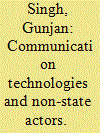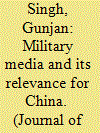|
|
|
Sort Order |
|
|
|
Items / Page
|
|
|
|
|
|
|
| Srl | Item |
| 1 |
ID:
136656


|
|
|
|
|
| Summary/Abstract |
China and India are the emerging economies in Asia and are in close geographical proximity to each other. What makes this RELATIONSHIP complicated is the fact that India and China have a disputed boundary and even though the relationship can be regarded as smooth historically, post-1962 the situation took a turn for worse. After a long 14-year gap of absent diplomatic relations after the 1962 war, India and China resumed their diplomatic contacts at the ambassadorial level only in 1976.1 The general perception of people on both sides has been one of negativity and mistrust towards the other. In addition, the force driving and shaping the formulation of foreign policy and diplomatic agenda has been influenced by heavy nationalism in India as well as China
|
|
|
|
|
|
|
|
|
|
|
|
|
|
|
|
| 2 |
ID:
089740


|
|
|
|
|
| Publication |
2009.
|
| Summary/Abstract |
The revolution in communication technology could be said to have happened with the advent of the Internet and Mobile phones. Over the last three to four decades the mobile telephone technology has shown exponential growth. Today, this mode of communication has been used almost in every facet of life. It has significant amount of utility for the armed forces too. Moreover, this technology has become very handy for various non-state actors. In the recent past there are varous incidents where few terrorist groups have used this technology to their advantage. This article attempts to analyze how terrorists groups are cleverly using modern means of communication to their advantage with major emphasis on mobile phones.
|
|
|
|
|
|
|
|
|
|
|
|
|
|
|
|
| 3 |
ID:
080481


|
|
|
| 4 |
ID:
186024


|
|
|
| 5 |
ID:
147214


|
|
|
|
|
| Summary/Abstract |
Xi Jinping became the General Secretary of the Communist Party of China in November 2012 and the President of the People’s Republic of China in March 2013. Ever since, under his leadership as the Chinese President, the Chinese Communist Party (CCP) has been progressively tightening its control over the media. In a Communist structure, the media is perceived to be the ‘mouthpiece’ of the Party and is supposed to be used for propaganda. Media is a very essential tool in spreading the government agenda and controlling the public discourse. In fact, the CCP had established the Department of Propaganda as early as in the year 1920.11. Erping Zhang, ‘Sars: Unmasking Censorship In China’, China Rights Forum, Seeds of Change, No. 3, 2003, p. 46, at http://www.hrichina.org/sites/default/files/PDFs/CRF.3.2003/Erping_Zhang.pdf (Accessed February 20, 2013).View all notes As David Bandurski put it, ‘press control is an essential element of political life in China and it is also real and immediate.’22. David Bandurski, ‘Jousting with Monsters: Journalists in a Rapidly Changing China’, in Timothy B. Weston and Lionel M. Jensen (eds.),China in and beyondtheHeadlines, Rowman & Littlefield, Lanham, MD, 2012, p. 29.View all notes Xi has taken the cue from his predecessors and has in fact gone past them to impose new controls over an already tame media in the name of strengthening the ideas of ‘peace and stability’ in Chinese society.
|
|
|
|
|
|
|
|
|
|
|
|
|
|
|
|
| 6 |
ID:
114284


|
|
|
|
|
| Publication |
2012.
|
| Summary/Abstract |
The role of the media in China has been one where it is expected to be the 'mouthpiece' of the party. Media outlets have been used by the Chinese Communist Party (CCP) as propaganda wings and are expected to inform the people about the CCP's policies and actions. In addition, the introduction of the Internet has transformed the media landscape. There has been a steady increase in the number of Internet users and blogs in China. In 2011, the number of Internet users was around 513 million.1 Broadly, the Chinese media can be divided into three categories: the party media, the military media, and the business media. This commentary attempts to analyse the role of the military media in China.
|
|
|
|
|
|
|
|
|
|
|
|
|
|
|
|
| 7 |
ID:
089904


|
|
|
|
|
| Publication |
2009.
|
| Summary/Abstract |
Democracy came to Taiwan under the leadership of Chiang Ching-Kuo, who had harboured the dream of overtaking the whole of China and establishing the rule of Kuomintang (KMT). But with the passage of time and a shift in the international political scenario, he realized that this would not be possible. The outcome of democratization was the Taiwanization of Taiwanese domestic politics and as democracy matured, subsequent Taiwanese leaders realized the benefits of maintaining the ongoing status quo across the Taiwan Straits. Important landmark in the change in the dynamics across the Straits was the economic integration of Taiwan with the mainland. The economic reforms that began on the mainland in 1978 saw both the economies becoming quite interdependent within a few decades. If one looks only from the economic perspective, then it is obvious that it is beneficial for both sides to maintain the status quo and not do anything rash in order to upset the ongoing balance.
|
|
|
|
|
|
|
|
|
|
|
|
|
|
|
|
| 8 |
ID:
085345


|
|
|
|
|
| Publication |
New Delhi, IDSA, 2009.
|
| Description |
264p.
|
| Standard Number |
9788171887415
|
|
|
|
|
|
|
|
|
|
|
|
Copies: C:2/I:0,R:0,Q:0
Circulation
| Accession# | Call# | Current Location | Status | Policy | Location |
| 054024 | 358.8/LEL 054024 | Main | On Shelf | General | |
| 054025 | 358.8/LEL 054025 | Main | On Shelf | General | |
|
|
|
|
|
|
|
|
|